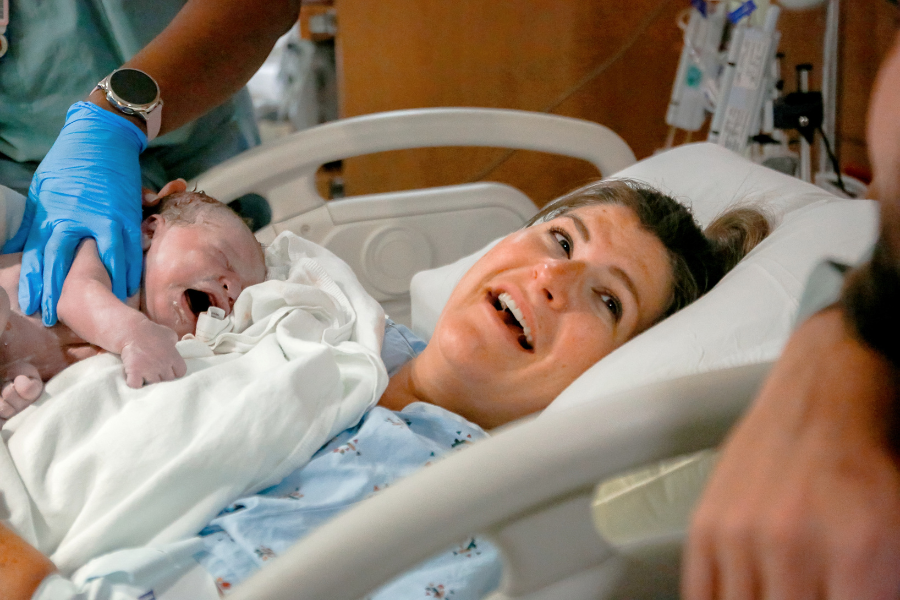Has pregnancy discharge got you perplexed? Well, you aren’t alone! Why is it different in pregnancy? Why is there so much of it? Is what I’m experiencing normal? When do I need to be concerned?
Are these questions you have asked yourself at some point during your pregnancy?! If so, consider yourself in the right place!
In this article you will find the answers to all of those questions and more! Buckle up, mama, all your wildest pregnancy discharge questions are about to be unlocked!
Follow @mommy.labornurse on Instagram to join our community of over 640k for education, tips, and solidarity on all things pregnancy, birth, and postpartum!
What is vaginal discharge?
In the simplest terms, vaginal discharge, made up primarily of mucus and bacteria, is a liquidy substance that comes out of the vagina. Also known as leukorrhea, there are many different reasons for vaginal discharge. Leukorrhea is very common and normal and is typically not something to be concerned about.
Is it normal to have pregnancy discharge?
It can be very normal to experience vaginal discharge (or an increased amount of discharge) during pregnancy. Normal leukorrhea during pregnancy is typically thin in texture, milky white or clear in color, and mild smelling or odorless.
You would never be wrong to discuss any potentially abnormal discharge with your OB provider. I would especially encourage you to bring it up if you notice the discharge has an unusual odor, is not milky white or clear in color, is thick and clumpy, or just doesn’t look right. Team “err on the side of caution” right here!
Does vaginal discharge change during pregnancy?
Vaginal discharge can change during pregnancy. Overall, it is normal to experience an increase in the amount of leukorrhea during pregnancy. In addition to an increase in the amount, you might also notice changes in the consistency or thickness as well. You can thank, or actually blame, pregnancy hormones for these changes!
What about early pregnancy discharge specifically?
For some women, an increase or change in vaginal discharge is one of the earliest signs of pregnancy. In fact, changes in discharge can occur as early as 1-2 weeks after conception – well before a woman’s missed period!
Again, “normal” vaginal discharge is usually milky white or clear, thin or an egg white consistency, and has a mild odor, if any at all. As with anything in pregnancy, if something doesn’t look, feel, or seem right, bring it to the attention of your OB provider.
Pregnancy discharge red flags
We have discussed what normal, healthy vaginal discharge looks and smells like, now let’s talk about some pregnancy discharge red flags.
Bleeding
Any amount of vaginal bleeding during pregnancy should be promptly reported to your OB provider. There are many different causes for bleeding during pregnancy and some are more concerning than others. It’s impossible to really know the cause without being evaluated, which is why a prompt call to your provider is so important!
Unusual odor
Vaginal discharge with an abnormal or funky odor might indicate an infection. Untreated infections in pregnancy can have negative outcomes for both mama and baby. If you notice that your discharge has an unusual odor, I recommend letting your provider know so they can test you for certain vaginal or urinary infections.
Unusual color
Similar to how an unusual odor can indicate a possible infection, so can an unusual color. We already discussed how normal, healthy discharge should be clear or milky white in color. If you notice yellow or green discharge that might also indicate infection and should be evaluated.
Vaginal itching
Vaginal discharge accompanied with vaginal itching should also be checked by a healthcare professional. Even if there isn’t an unusual odor and the color is normal, still let your provider know if you are experiencing discharge and vaginal itching during pregnancy. This is another possible sign of infection and something that might require treatment or medication.
Sudden increase in discharge
A sudden increase in vaginal discharge might not mean anything at all but it might be indicative that something is going on. Especially if the discharge is clear and watery and you have any concern that your water has broken. This is obviously more of a concern if you are preterm (less than 37 weeks pregnant).
Related Reading: All About Water Breaking During Pregnancy
How to manage pregnancy discharge?
There are a few things you can do to help manage pregnancy discharge.
Panty liners
If you are experiencing a lot of discharge DO NOT use tampons! You can use a panty liner or pad in your undies but nothing should go inside your vagina.
Breathable, cotton underwear
This goes for pregnant or not. Your chance of developing an infection (especially with an increased amount of discharge) increases if your vagina can’t get air and breathe. So get yourself some cotton undies, girl!
Regular bathing and good hygiene
This one is pretty obvious but I had to include it! Proper bathroom hygiene and keeping your vagina clean can help manage pregnancy discharge. Not only can this help with the discharge, but it can also keep your vaginal bacteria and pH in balance to keep infections at bay.
Keep it dry
Extra discharge means extra moisture down there. And extra moisture might increase your chances of not only feeling uncomfortable but possible complications too. Keep it dry, mama!
What about water breaking in pregnancy?
Let me just tell you that rarely does your water break in one giant gush like Hollywood leads us to believe. I’m speaking from experience here! Even as a labor and delivery nurse, I still questioned whether my water had actually broken in one of my pregnancies. It’s not always cut and dry.
There are typically two different scenarios when it comes to water breaking. The big, dramatic gush, like I referenced above, or the slow, steady trickle, which is what happened to me. The big, dramatic gush doesn’t leave much to question but the slow, steady trickle is when things get tricky.
How can you tell the difference between vaginal discharge and water breaking? The big difference is the consistency. Vaginal discharge is stickier, like an egg-white consistency and amniotic fluid is basically the consistency of water.
If you want to learn more about water breaking during pregnancy then check out the article below!
Related Reading: All About Water Breaking During Pregnancy
Wrapping up
I hope this article has demystified any and all questions you had about pregnancy discharge. The most important thing I want you to take away from this is that if you have any concerns – call your provider!
And for more pregnancy and birth related resources be sure to check out the links below!






